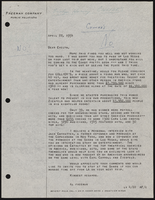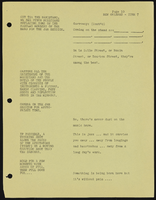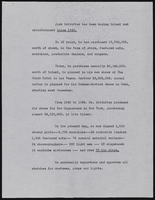Search the Special Collections and Archives Portal
Search Results
Joe Andre Photograph Collection
Identifier
Abstract
The Joe Andre Photograph Collection (approximately 1906-1980) contains photographic prints, postcards, and negatives documenting Joe Andre’s life. The images in this collection document his involvement in the United States Marine Corps Band and his days as a touring musician throughout the northwest and southwest United States. Also included are photographs of family vacations and businesses he owned in Beatty, Nevada.
Archival Collection
Jimmy Wilkins oral history interviews
Identifier
Abstract
Oral history interviews with Jimmy Wilkins conducted by Lisa Gioia-Acres on May 30, 2008 and September 15, 2008 for the All That Jazz Oral History Project. In these interviews, Wilkins discusses his career as a jazz trombonist. He begins by talking about his upbringing in St. Louis, Missouri, his early interest in being a musician, learning to play the trombone in high school, and later enlisting in the United States Navy to play in Navy bands. Wilkins describes leaving the Navy after World War II ended and continuing his musical career by joining jazz bands in the St. Louis area, playing across the United States with traveling bands, and eventually moving to Las Vegas, Nevada in 1994. He talks about playing jazz in casinos such as the Four Queens and the Riviera, the current jazz culture in Las Vegas, and his retirement.
Archival Collection
Raymond Roberts oral history interview
Identifier
Abstract
Oral history interview with Raymond Roberts conducted by his wife, Genevieve Roberts, on March 13, 1981 for the Ralph Roske Oral History Project on Early Las Vegas. In this interview, Roberts describes his career as a musician and as a draftsman. As a draftsman, Roberts designed schools and houses for architect Julius Gabriel. Roberts also helped design road improvements and community buildings for Clark County, Nevada as a civil engineer.
Archival Collection
George Pollak oral history interview
Identifier
Abstract
Oral history interview with George Pollak conducted by Lisa Gioia-Acres on May, 25, 2010 for the All That Jazz Oral History Project. Pollak discusses breaking into the music industry and attending accounting school and working as an accountant while still performing in clubs. He also discusses playing with his band at Caesars Palace Hotel and the Tropicana Hotel, African-Americans in the music industry, and drug use among musicians. Pollak then discusses how Las Vegas, Nevada has changed, in terms of the entertainment industry.
Archival Collection
Barbara and Norman Kaye oral history interviews
Identifier
Abstract
Oral history interviews with Barbara and Norman Kaye conducted by Claytee D. White on February 24, 2010, March 09, 2010, and December 06, 2011 for the Boyer Early Las Vegas Oral History Project. Barbara Kaye begins the interview by discussing her career as a showgirl and moving to Reno, Nevada in 1955 to work as a dancer in a show at the Mapes Hotel in 1955. She then talks about later moving to Las Vegas, Nevada to dance at the Riviera Hotel & Casino. She also describes living briefly in Hawaii with her husband, Norman Kaye, his career as a musician, and the life of a Las Vegas showgirl. Norman Kaye discusses his career as a musician in the Mary Kaye Trio with his sister, Mary Kaye. He recalls when they performed at the El Rancho Hotel and Casino, Tropicana Hotel, and Sahara Hotel and Casino, as well as his songwriting outside of the group and being named the poet laureate of Nevada by Governor Grant Sawyer. Lastly, he talks about his career in real estate and his company, Norman Kaye Real Estate.
Archival Collection

Transcript of interview with Santo Savino by Lisa Gioia-Acres, September 23, 2008
Date
Archival Collection
Description
Santo was born in the Bronx, New York in 1937. Santo’s family includes his father who was a butcher, and his mother who mostly stayed at home to raise the children, as well as a brother who currently lives with Santo. Santo recalls that it was great growing up in the Bronx, and he spent most of his life there until he joined the Air Force when he was 17. Santo’s immediate family was not musically oriented, but he learned to play the drums from a cousin. Music came easy for Santo, and he started getting paid for playing when he was 12. At 17, Santo joined the Air Force with a group of friends. He auditioned for and was accepted into the Air Force band where he played drums for four years. Santo was married with a child and another child on the way when he ended his military career and moved to California. After jobs working as a security guard and on an assembly line, Santo knew he just wanted to play and came to Las Vegas in 1960 to play with a band. It took several years before Santo was able to get on with a permanent band. Once Santo broke into the scene in Las Vegas, he played for six years at the Flamingo. Following that he was on the road for a couple of years with Paul Anka. Upon returning to Las Vegas, Santo worked for 14 years at the Sahara. Santo talks about when “the boys” had the hotels before the corporations came in and how everything changed. Currently, Santo does a lot of work with trumpet player Carl Saunders, frequently traveling to Los Angeles to do recordings together.
Text

Transcript of interview with Judy Jetter by Lisa Gioia-Acres, September 10, 2008
Date
Archival Collection
Description
Judy Jetter, a devout jazz music enthusiast, was born in a Chicago suburb in 1939. At the age of three, Judy began taking acting as well as tap and ballet classes. While raised by her mother until age 15 Judy was forced to study opera even though jazz music was her passion. Her first introduction to jazz came while listening to, legendary jazz great, Woody Herman on the radio. Judy developed an instant appreciation and love for jazz music. While working as a commercial actress during her childhood - Super Circus and Peter Pan peanut butter - Judy experienced live performances by the Stan Kenton Orchestra and was completely amazed. After graduation Judy was married and gave birth to her son. She worked for a movie studio in Chicago doing various jobs such as cleaning the stage, typing scripts, model work, and even playing the role of housewife. Later Judy went to college and earned a degree in psychology, which led to a job as a therapist. However, after remarrying to Bill Jetter, Judy switched careers and soon became an exercise instructor at the YMCA. There she cultivated her passion for working with people who suffered from disabilities. In particular, Judy developed a water regiment specifically designed for people with disabilities. Judy would go on to share her experiences in this field in two subsequent book publications. Unfortunately Judy's husband passed away with cancer. However, Judy found refuge and support from a group of jazz enthusiasts. Alongside her cadre, Judy began really studying how to listen to music. She moved to Las Vegas in 1992 and can often be found at different jazz venues throughout the city. She enjoys the local jazz scene in Las Vegas and making her weekly rounds to take-in Big Band and jazz singers such as Jobell and Terri James, as well as going to see Bruce Harper playing at Bugsy's, and the talented Gus Mancuso performing at the Bootlegger. Judy believes that music, like everything else, has evolved and will continue to mature; however, jazz musicians such as Louis Armstrong still remain as the foremost contributors in the long history of jazz music. Her hope is that music and the arts will continue to be offered through education to allow the next generation another "dimension to not only their education but their soul."
Text



